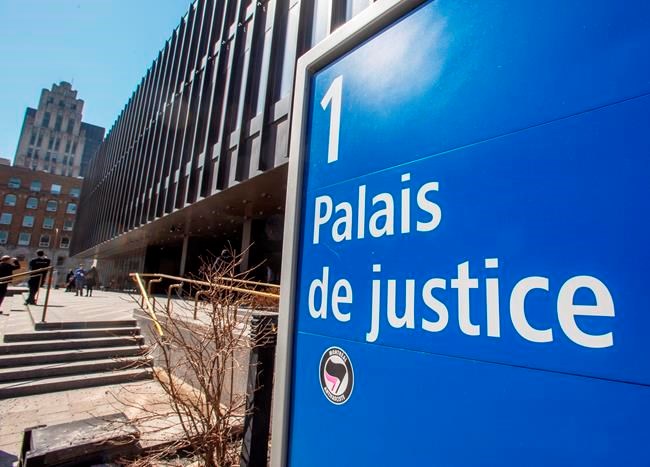MONTREAL — Giving someone the middle finger is a "God-given" right that belongs to all Canadians, a Quebec judge said as he recently acquitted a Montreal-area man of criminal harassment and uttering threats.
In his ruling, Quebec court Judge Dennis Galiatsatos wrote that not only was Neall Epstein not guilty, but the fact that he was arrested and prosecuted at all was a bewildering injustice.
"To be abundantly clear, it is not a crime to give someone the finger," the judge wrote in his Feb. 24 ruling. "Flipping the proverbial bird is a God-given, Charter-enshrined right that belongs to every red-blooded Canadian. It may not be civil, it may not be polite, it may not be gentlemanly. Nevertheless, it does not trigger criminal liability."
Police arrested Epstein, a 45-year-old teacher, on May 18, 2021, as he returned home from a walk. Earlier in the day, he had run into a neighbour — Michael Naccache — who lived on the same Beaconsfield, Que., street and with whom he had previous conflicts.
Naccache, 34, swore at Epstein and threatened him while holding a power tool "in a menacing way," the judge found. Epstein replied with two middle fingers and continued walking.
Naccache alleged that Epstein also made a throat-slashing gesture and said he feared Epstein would come back and try to kill him — claims that the judge did not accept.
"On what basis did he fear that Mr. Epstein was a potential murderer? The fact that he went for quiet walks with his kids? The fact that he socialized with the other young parents on the street? If that is the standard, we should all fear that our neighbours are killers-in-waiting," Galiatsatos wrote.
The incident was the culmination of a series of interactions between the two men and members of their families. Naccache claimed those interactions amounted to months of harassment, but the judge found them to be innocent behaviour.
"To the complainants, the presence of young families outside is a source of scorn and vivid resentment that ultimately spilled over into a criminal complaint against their neighbour," the judge wrote, describing Epstein as a "caring father of two young daughters who committed no crime whatsoever."
He called it "deplorable" that the complainants "weaponized the criminal justice system in an attempt to exert revenge on an innocent man."
Naccache said he thought Epstein regularly and surreptitiously filmed him and his family. In reality, the judge concluded, it was Naccache who had been filming Epstein and other neighbours from cameras mounted outside the home in which he lived with his parents and brother. He also had cameras on his motorcycle and in his parents' cars.
In one incident, video submitted as evidence shows Naccache's mother, Martine Naccache, driving dangerously near neighbourhood children, the judge wrote. About an hour later, Naccache's father, Frank Naccache, "deliberately and spitefully" did the same, the ruling says, leading to a confrontation with several neighbourhood fathers, including Epstein.
Epstein testified that during that episode, Frank Naccache threatened to intentionally hit the children with his car. Michael Naccache claimed in court that Epstein assaulted his parents during that confrontation, but the video evidence instead showed Naccache's brother, Ari Naccache, pushing Epstein, who then walked away in what the judge called a "remarkable exercise of restraint."
Galiatsatos wrote that Martine and Frank Naccache should consider themselves lucky they weren't ticketed for reckless driving. He added that the two Naccache brothers were fortunate they weren't charged with assault or uttering threats.
Galiatsatos wrote that he wished he could literally — not just figuratively — throw the case out of court.
"In the specific circumstances of this case, the Court is inclined to actually take the file and throw it out the window, which is the only way to adequately express my bewilderment with the fact that Mr. Epstein was subjected to an arrest and a fulsome criminal prosecution."
Audrey Roy-Cloutier, a spokeswoman for Quebec's prosecution service, said that prosecutors must remain convinced throughout the judicial process that there is a reasonable prospect of conviction.
In this case, Roy-Cloutier wrote in an email Wednesday, the prosecutor concluded that the evidence didn't meet the threshold for a conviction while Epstein was testifying.She declined tocross-examineEpstein and instead asked the judge to acquit.
While Roy-Cloutier said the prosecution service disagrees with some of the statements made by the judge in his ruling, the decision will not be appealed.
The Montreal police servicesaid it is analyzing the decision and declined to comment further. A message left for Epstein through his lawyer was not immediately returned, and a phone message left at the Naccache home was also not returned.
This report by The Canadian Press was first published March 8, 2023.
Jacob Serebrin, The Canadian Press



